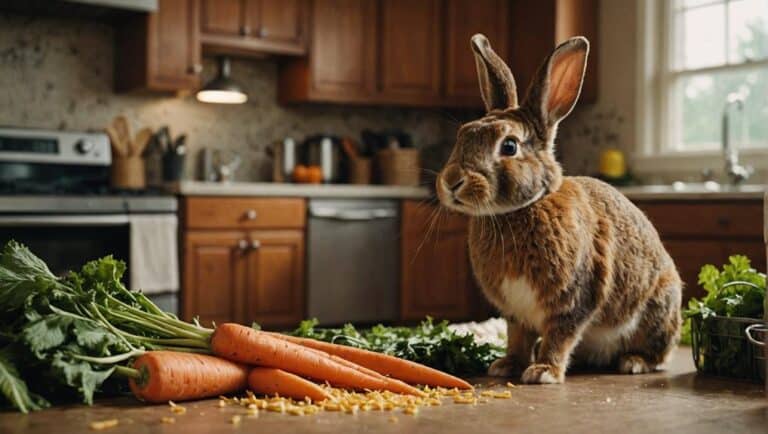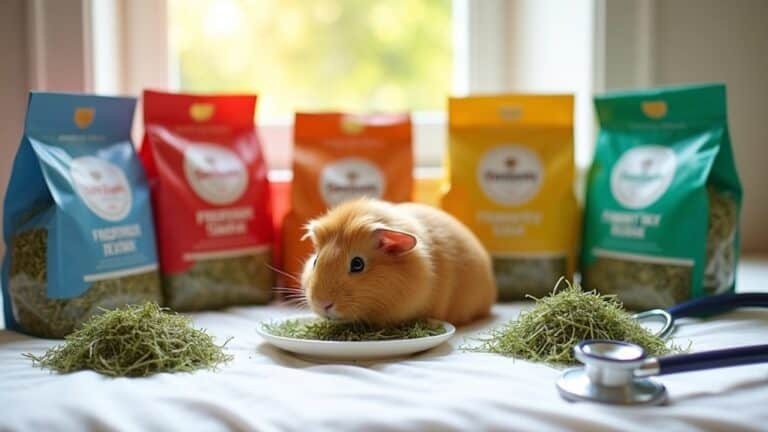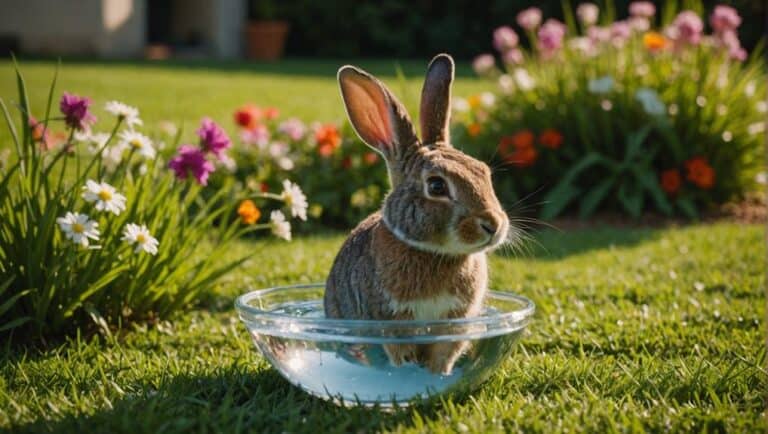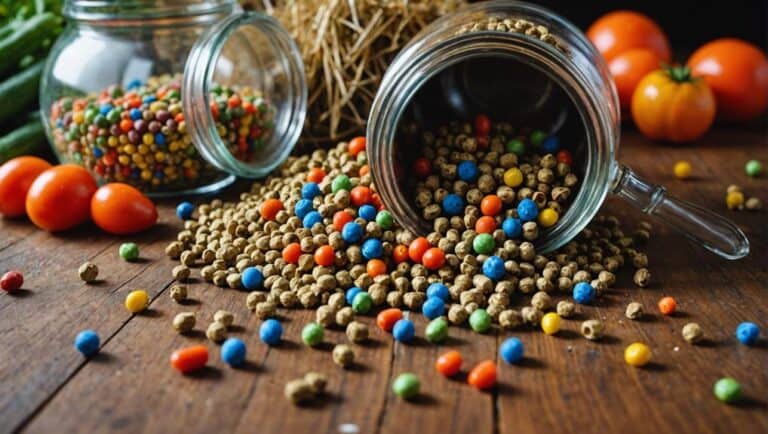Isn't it fascinating how the right diet can shape a young bunny's future? You'll find that the nutritional needs of baby bunnies evolve rapidly in their early stages. Initially dependent on their mother's milk, they soon change to solid foods, requiring careful attention to what's offered. As you consider the balance of hay, pellets, and fresh greens, you might wonder how these choices impact their health and growth. Understanding this delicate balance can lead to healthier, happier bunnies in the long run. What specific elements do you think are most important in this process?
Contents
Understanding Baby Rabbit Nutrition
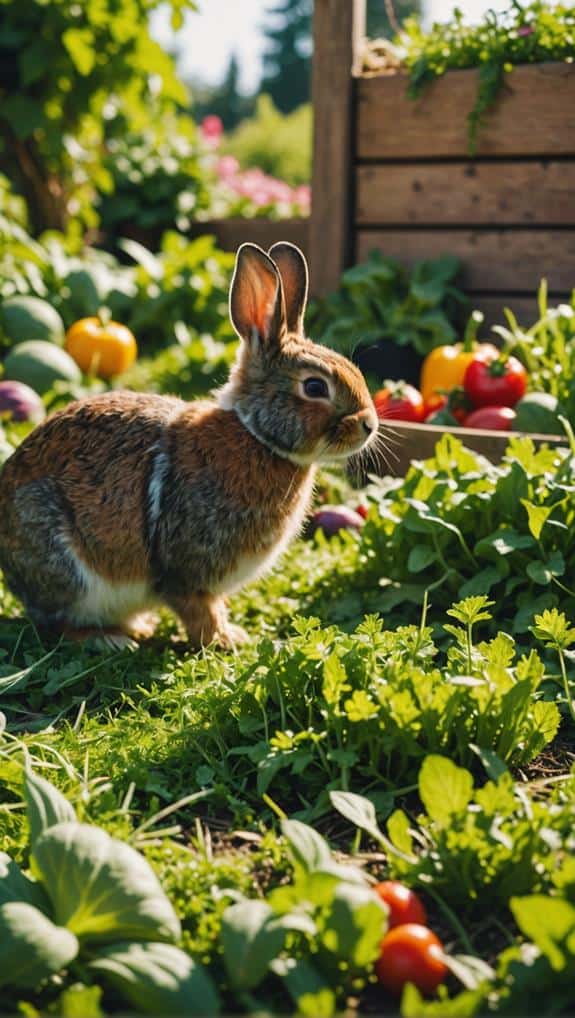
When it comes to baby rabbit nutrition, understanding their specific needs is fundamental for their healthy development. During the first weeks of life, baby rabbits rely heavily on their mother's milk, which provides the essential antibodies and nutrients they need.
Weaning typically occurs around 6-8 weeks, but you can start introducing solid food at 2-3 weeks, beginning with high-quality alfalfa-based pellets. It's important to guarantee that these pellets are high in fiber and free from artificial additives, as a core diet component for ideal growth. At around 3-4 weeks, make sure they've access to fresh water, as this is critical when shifting from a milk-only diet.
From 7 weeks onward, Alfalfa hay becomes essential, supplying necessary protein and fiber; offer it in unlimited quantities to support their growth. You should also incorporate leafy green vegetables into their diet gradually.
Monitoring their weight and droppings is significant during this growth stage to prevent dietary issues and confirm they're meeting their nutritional needs. If you notice any irregularities, adjust their diet accordingly.
Essential Diet for Baby Bunnies
As baby bunnies grow and begin to explore solid foods, their dietary requirements shift to include a balance of nutrients that support their rapid development. Initially, they rely on their mother's milk until weaning occurs around 6 to 8 weeks. During this time, they start nibbling on hay as early as 2-3 weeks, with significant dietary changes occurring by 3-4 weeks when they mimic their mother's eating habits.
At around 4 weeks, you should introduce alfalfa hay, which is fundamental for its high protein content and calorie density, supporting their growth during these critical early stages. Make sure to provide fresh water around 3-4 weeks to facilitate their shift from milk to solid foods and to prevent dehydration.
As they approach 6-7 months, gradually reduce their reliance on alfalfa hay and transition them to grass hay, such as Timothy. This change is essential for their long-term health, ensuring they receive the right balance of fiber and nutrients necessary for adult bunnies.
Introducing Solid Foods
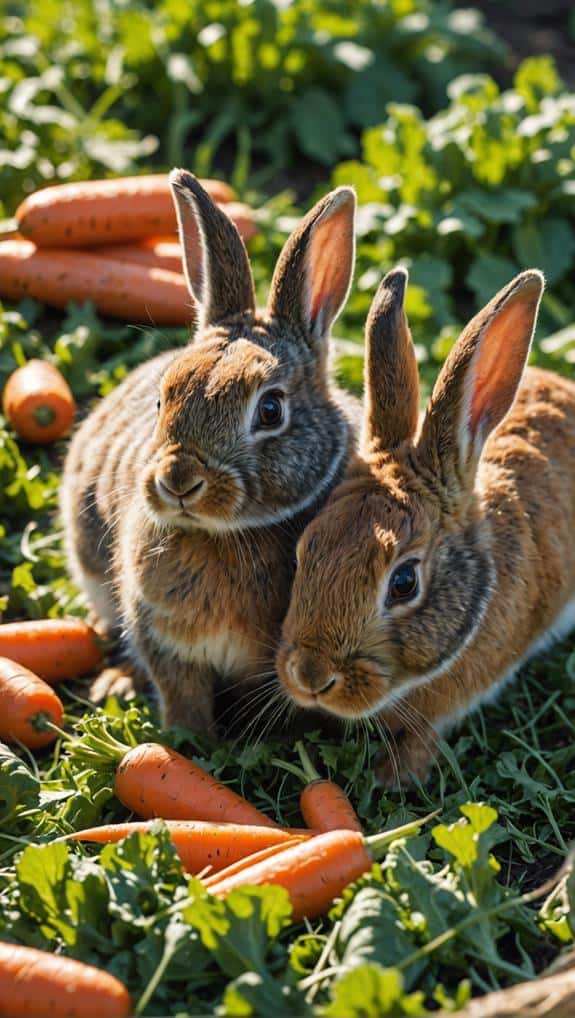
Introducing solid foods marks a significant milestone in a young bunny's development. This phase typically begins around 2-3 weeks of age, when mothers encourage their babies to nibble on hay, aiding their shift from a milk-based diet.
By 3-4 weeks, you'll notice your young rabbits mimic their mother's feeding habits, gradually eating more substantial solid foods while still having access to milk. It's vital to guarantee that the introduction of solid foods is done gradually, as unexpected changes can lead to digestive disturbances;
monitoring stool and overall health during this period is significant.
To guarantee a smooth solid food introduction, consider these key points:
- Provide high-quality hay: Unlimited access to high-quality hay should be prioritized, especially Alfalfa hay around 7 weeks, due to its protein richness.
- Introduce appropriate pellets: Choose a pellet formulated for young rabbits, making sure it complements their growing dietary needs.
- Monitor the weaning process: This typically occurs between 6-8 weeks, marking the shift of their digestive systems from liquids to solids.
- Access to fresh greens: After weaning, gradually introduce fresh greens, limiting new items to prevent digestive issues.
Feeding Guidelines for Young Rabbits
As you prepare to feed your young bunny, understanding their nutritional requirements is essential for healthy growth. Ensuring that your furry friend receives a balanced diet is key to their overall well-being. Fresh hay should be the cornerstone of their meals, as it provides the necessary fiber for healthy digestion. Alongside hay, you can introduce a variety of fresh greens and high-quality pellets specifically formulated for young rabbits. For more guidance, consider exploring some baby bunny nutrition tips to help support their growth and development.
Young rabbits require a diet rich in key nutritional components for bunnies' diet, including high-quality hay, pellets, and fresh greens to support their rapid development.
You'll need to navigate through the progression diet phases, ensuring a balanced intake of hay, pellets, and fresh greens.
Additionally, monitoring health indicators will help you adjust their diet for ideal development.
Nutritional Requirements Overview
Young rabbits have specific nutritional needs that are vital for their growth and development. As a caretaker, understanding these requirements is important to support your baby rabbit's health. During the first weeks, they rely on their mother's milk, but you should start introducing solid foods around 3-4 weeks to aid their digestive change. Here are key guidelines:
- Alfalfa Hay: Offer unlimited amounts of Alfalfa hay to provide the high protein essential for young rabbits. Shift to grass hay, like Timothy or Meadow hay, as they mature.
- High-Quality Pellets: Post-weaning, serve an egg cup of high-quality alfalfa-based pellets daily to meet their nutritional requirements.
- Fresh Leafy Greens: Gradually introduce fresh leafy greens to avoid digestive disturbances, guaranteeing variety and nutrient density.
- Water Intake: Confirm fresh water is available continuously from 3-4 weeks old, as young rabbits' water intake will increase with their dietary shift.
Monitoring weight and droppings is vital to confirm they're absorbing nutrients adequately. This allows you to detect any potential dietary issues early on.
This attentive care fosters a healthy growth trajectory for your young bunny.
Transitioning Diet Phases
At around 3-4 weeks of age, your baby rabbit's diet begins to shift from solely relying on mother's milk to incorporating solid foods, an essential change for their health and development. During this changeover phase, you'll introduce unlimited hay, particularly alfalfa, which is rich in protein and key for growth.
Continue offering mother's milk until weaning occurs between 6-8 weeks.
After weaning, focus on maintaining a diet that includes a daily portion of alfalfa pellets—approximately the size of an egg cup—while still emphasizing unlimited hay. As you introduce fresh greens post-weaning, do so gradually to avoid digestive issues; limit new types to one at a time.
This careful approach guarantees a balanced diet, with hay remaining the primary source of nutrition.
As your young bunnies approach 4 months, it's time to start reducing their pellet intake and begin shifting from alfalfa to grass hay. This alteration promotes healthier dietary habits as they mature.
Monitoring Health Indicators
Monitoring your young rabbit's health indicators is essential for guaranteeing they receive the proper nutrition during their formative weeks. Keeping a close eye on their dietary habits can help you identify any potential issues early on.
Here are key factors to monitor:
- Healthy Droppings: Observe for cocoa puff-shaped droppings. Soft or unusual droppings may signal dietary issues or the need for an adjustment.
- Hay Intake: Verify their daily hay intake is proportional to their body size. This promotes ideal fiber consumption and supports healthy digestion.
- Introduction of Fresh Foods: Gradually introduce leafy greens, limiting fresh foods initially to prevent digestive problems. Only introduce one new type at a time to monitor for adverse reactions.
- Vet Consultation: If your young rabbit refuses to eat or if droppings diminish, seek immediate veterinary consultation, as they're particularly vulnerable to rapid health declines.
Transitioning to Adult Diet
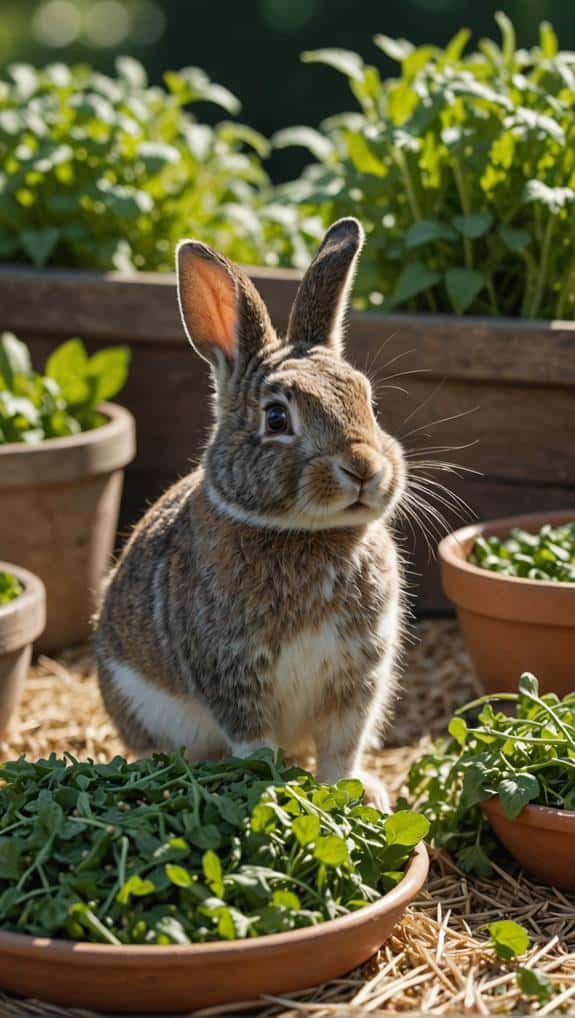
Beginning the shift to an adult diet around six months of age is essential for your bunny's health. During this changeover, gradually replace alfalfa with mixed grass hay, such as Timothy or Meadow hay, over several weeks.
This gradual introduction aids in optimal digestion, reducing the risk of health issues related to abrupt dietary changes.
For adult rabbits, grass hay should constitute at least 80% of their diet, ensuring proper digestion and supporting dental health. Limit the amount of pellets to no more than 1/4 cup per 5 lbs of body weight. This helps maintain a healthy weight while ensuring adequate nutrient intake.
As you implement these changes, regular monitoring of your bunny's weight, droppings, and overall health is critical. Observing these indicators will help you determine if the dietary changeover is being well tolerated.
Adjust the diet as necessary based on your observations to prevent any potential health issues. Remember, your young bunny's shift to an adult diet is an essential step in promoting lifelong health and well-being, and your attention to detail during this phase can make all the difference.
Importance of Hay and Pellets
Hay is essential for your young bunny's diet, providing necessary fiber that supports healthy digestion and prevents gastrointestinal issues.
When selecting pellets, prioritize high-quality options that align with your bunny's age, as these will complement their nutritional needs without compromising health.
Understanding the importance of both hay and pellets guarantees your bunny receives the essential nutrients required for peak growth and development.
Essential Nutrients From Hay
At the foundation of a young bunny's diet lies high-quality hay, essential for their growth and overall health. Providing the right type of hay guarantees your young rabbit receives important nutrients necessary for robust development.
Here are four significant aspects of hay in their diet:
- High Fiber Content: Timothy hay and other grass hays contain 19% fiber, promoting ideal gut motility and preventing gastrointestinal issues.
- Protein and Calcium: Alfalfa hay, rich in protein and calcium, is essential for young rabbits up to 6-7 months, supporting healthy growth and development.
- Fresh Availability: Always provide fresh hay; it's fundamental for maintaining digestive health and preventing common problems in young rabbits.
- Balanced Shift: Gradually shifting from alfalfa hay to a mix of grass hays guarantees a balanced diet, preparing your bunny for adulthood while preventing future health complications.
Incorporating these elements into your young rabbit's diet not only supports their immediate nutritional needs but also lays the groundwork for a long, healthy life.
Pellet Quality Matters
While hay forms the cornerstone of a young bunny's diet, the quality of pellets is equally important for their growth and health. High-quality pellets provide essential nutrients, specifically a protein level of 16%, which supports the rapid growth of young rabbits.
Pellets should be formulated with an alfalfa base during this phase, guaranteeing adequate calcium and protein intake important for healthy development.
Regulating the quantity of pellets to about 1/4 cup per 2 lbs of body weight daily is critical, as hay should remain the primary component to promote digestive health. It's important to avoid colorful pieces in pellets, as these often contain excess sugars and additives that can lead to health complications, including obesity and digestive issues.
As young rabbits mature, shifting from alfalfa pellets to timothy-based pellets should begin around six months of age. This change is necessary to mitigate health complications associated with excessive calcium intake in adult rabbits.
Fresh Foods for Young Rabbits
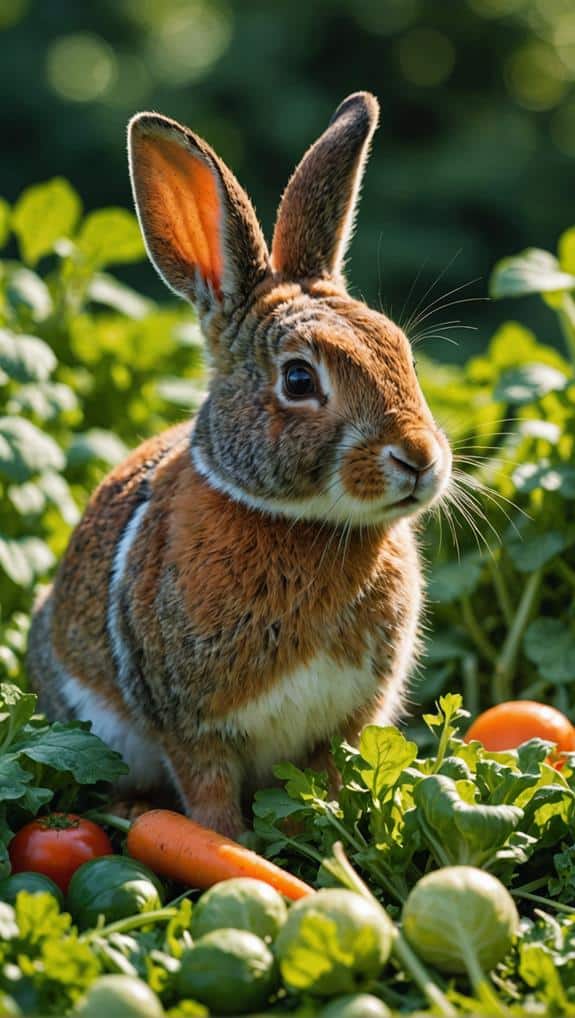
Introducing fresh foods to young rabbits is a significant step in enhancing their diet and overall health. Around six weeks of age, you can start incorporating fresh leafy greens and vegetables. However, it's imperative to introduce these foods gradually to prevent digestive issues.
Here are four key fresh foods to take into account:
- Basil – A flavorful herb that adds variety and important nutrients.
- Dandelion Greens – Rich in vitamins and minerals, they support healthy growth.
- Romaine Lettuce – Offers hydration and fiber, but should be given in moderation.
- Carrots – These should be offered sparingly due to their sugar content.
While fresh foods are significant, they shouldn't make up more than 10-15% of your young rabbit's overall food intake. Make sure that all vegetables are thoroughly washed and free from pesticides or herbicides.
Additionally, always provide fresh, clean water to support hydration, especially when introducing solid foods. Monitoring your bunny's reactions to new foods is paramount to guarantee a healthy diet and avoid any potential digestive issues.
Hydration and Water Needs
Ensuring young rabbits stay well-hydrated is essential for their growth and overall health, particularly as they shift from mother's milk to solid food. Around 3-4 weeks of age, they begin to drink water, and their intake should increase during diet alterations.
Regular access to fresh, clean water is vital for maintaining ideal hydration levels, which directly impacts their well-being.
As you introduce dry hay into their diet, keep in mind that it requires more water for digestion compared to fresh leafy greens. As a result, hydration becomes even more important at this stage.
It's advisable to provide water in a shallow bowl rather than a bottle, as this not only prevents mess but also encourages young rabbits to drink more freely.
Monitor their water intake closely; a noticeable decrease can indicate potential health issues. Adequate hydration supports their development and helps prevent complications associated with dehydration.
Signs of a Healthy Diet
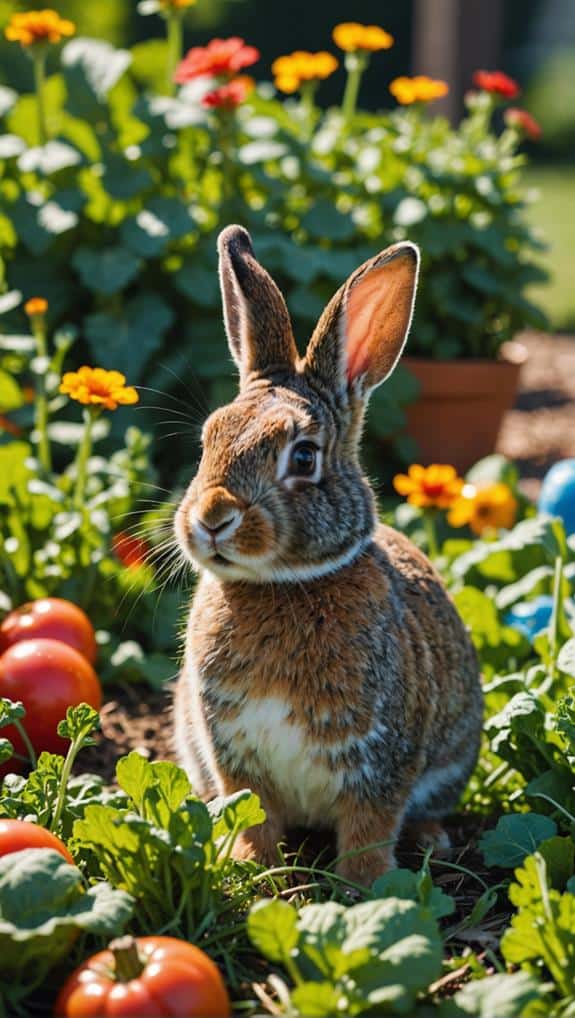
A healthy diet for young rabbits is evident through several key indicators that reflect their nutritional status and overall well-being.
Observing these signs will help guarantee that your rabbits are receiving the necessary nutrition for ideal growth.
- High Energy Levels: Healthy rabbits are typically active and curious, showcasing their liveliness and proper nutrition.
- Consistent Appetite: Regular consumption of hay and pellets indicates a balanced diet, essential for supporting their growth and development.
- Normal Droppings: Droppings should be cocoa puff-shaped. If you notice uneaten cecotropes, this could signal dietary imbalances or insufficient hay intake.
- Balanced Weight: A healthy young rabbit should have a noticeable but not sharp bone structure. This balance reflects good nutrition and overall health.
Monitoring these signs closely will help you identify any symptoms of potential dietary issues early on.
If you notice a decrease in hay consumption, it could lead to digestive problems, indicating that dietary adjustments may be necessary.
Final Thoughts
In nurturing young bunnies, think of their diet as the foundation of a sturdy house; without quality materials, it can't stand strong. By providing high-quality pellets, fresh greens, and unlimited hay, you're building a solid structure for their growth. Just as a house needs maintenance, consistent monitoring of their health guarantees your bunnies thrive. With the right nutrition and care, you're not just feeding them; you're laying the groundwork for a vibrant, healthy life ahead.

